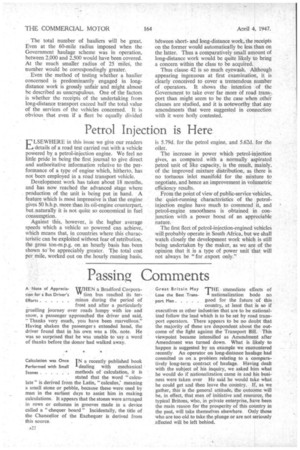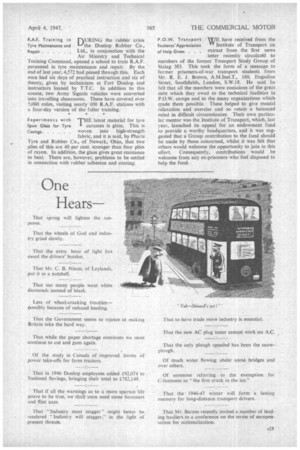Passing Comments
Page 24

Page 25

If you've noticed an error in this article please click here to report it so we can fix it.
A Note of Apprecia11UHEN a Bradford Corpora tion for a Bus Driver's " tion bus reached its ter Efforts minus during the period of frost and after a particularly gruelling journey over roads lumpy with ice and snow, a passenger approached the driver and said, "Thanks very much, you have been marvellous." Having shaken the passenger s extended hand, the driver found that in his own was a 10s. note. He was so surprised that he was unable to say a word of thanks before the donor had walked away.
calculation was Once MI a recently published book Performed with Small Ideating with mechanical Stones methods of calculation, it is stated that the word " calculate " is derived from the Latin, "calculus,' meaning a small stone or pebble, because these were used by man in the earliest days to assist him in making calculations. It appears that the stones were arranged in rows or columns in grooves made in a device called a "chequer board" Incidentally, the title of the Chancellor of the Exchequer is derived from this source. Great Britain May 'THE immediate effects of Lose the Best TransI nationalization bode no port Men good for the future of this country, at least that is so if executives in other industries that are to be nationalized follow the lead which is to be set by road transport operators. There appears to be no doubt that the majority of these are despondent about the outcome of the fight against the Transport Bill. This viewpoint became intensified as Amendment after Amendment was turned down. What is likely to happen is suggested by an example we encountered recently An operator on long-distance haulage had consulted us on a problem relating to a comparatively long-term contract of haulage. Having dealt with the subject of his inquiry, we asked him what he would do if nationalization came in and his business were taken over He said he would take what he could get and then leave the country. If, as we gather, this is the general attitude, the outcome will be, in effect, that men of initiative and resource, the typical Britons, who, in private enterprise, have been the main reason for the prosperity of this country in the past, will take themselves elsewhere. Only those who are too old to take the plunge or are not seriously affected will be left behind. R.A.F. Training in MIRING the rubber crisis Tyre Maintenance and 3-"the Dunlop Rubber Co., Repair Ltd., in conjunction with the Air Ministry and Technical Training Command, opened a school to train R.A.F. personnel in tyre maintenance and repair. By the end of last year, 4,572 had passed through this. Each man had six days of practical instruction and six of theory, given by technicians at Fort Dunlop and instructors loaned by T.T.C. In addition to this course, two Army Signals vehicles were converted into travelling classrooms. These have covered over 5,000 miles, visiting nearly 100 R.A.F. stations with a four-day version of the fuller training; Experiments with THE latest material for tyre
Spun Glass for Tyre carcases is glass. This is Casings woven into high-strength
fabric, and it is said, by Pharis Tyre and Rubber Co., of Newark, Ohio, that two plies of this are 40 per cent. stronger than four plies of rayon. In addition, the glass gives great resistance to heat. There are, however, problems to be settled in connection with rubber adhesion and coating. P.O.W. Transport WE have received from the Students' Appreciation YV Institute of Transport an
of Help Given . . extract from the first news letter recently circulated to members of the former Transport Study Group of Stalag 383. This took the form of a message to former prisoners-of-war transport students from Mr. R. E. J. Brown, A.M.Inst.T., 180, Engadine Street, Soutlffields, London, &W.18. He said he felt that all the members were conscious of the great debt which they owed to the technical facilities in P.O.W. camps and to the many organizations which made them possible. These helped to give mental relaxation and exercise and so retain a balanced mind in difficult circumstances. Their own particular mentor was the Institute of Transport, which, last year, launched its appeal for an endowment fund to provide a worthy headquarters, and it was suggested that a Group contribution to the fund should be made by those concerned, whilst it was felt that others would welcome the opportunity to join in this effort. Consequently, contributions would be welcome from any ex-prisoners who feel disposed to help the fund.












































































